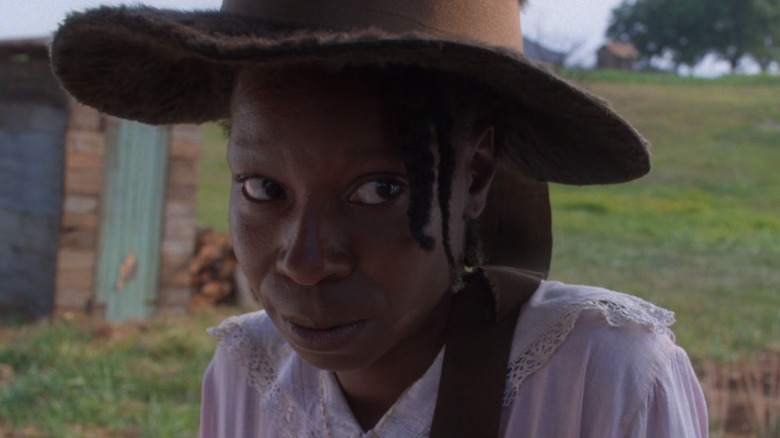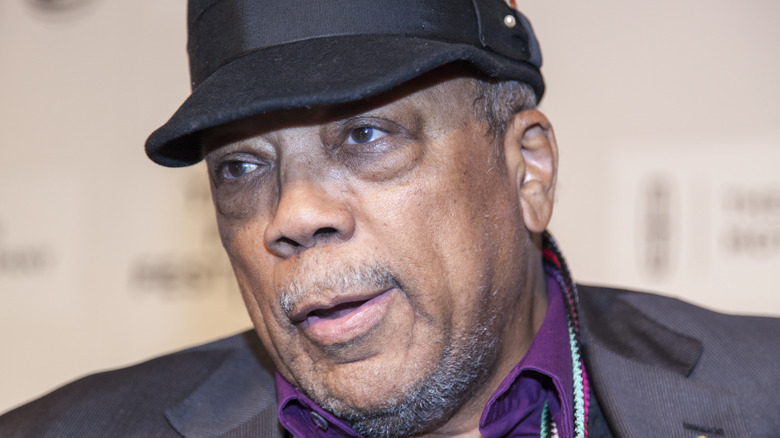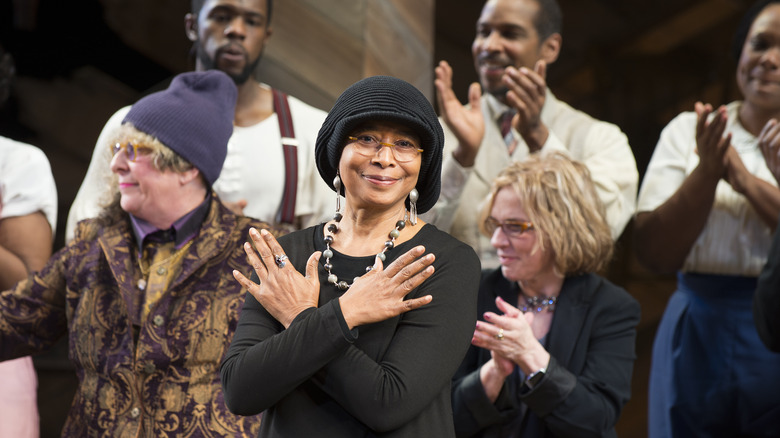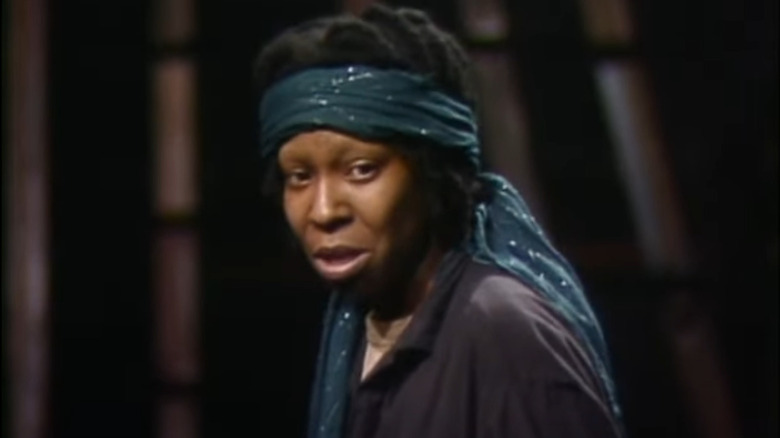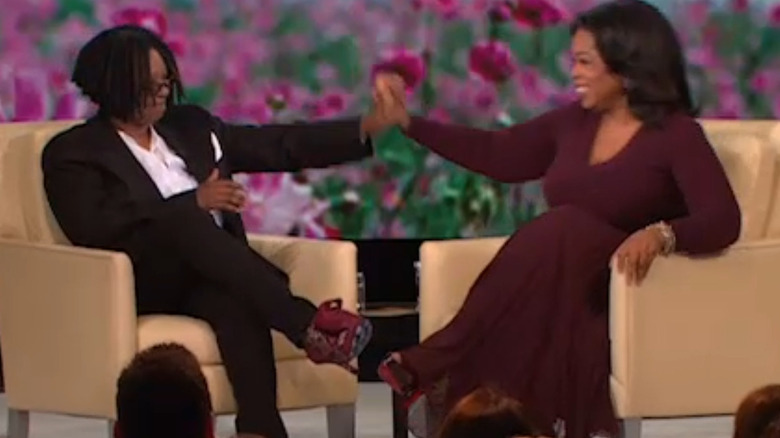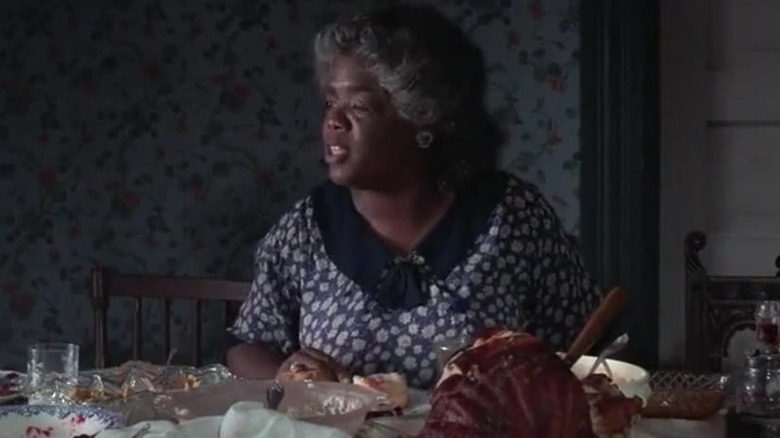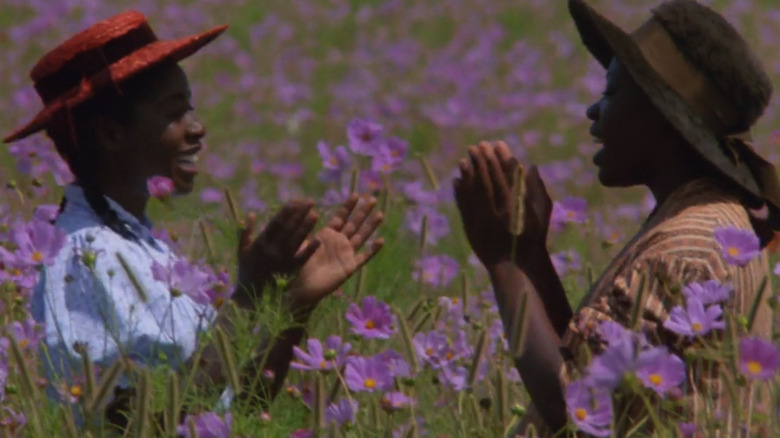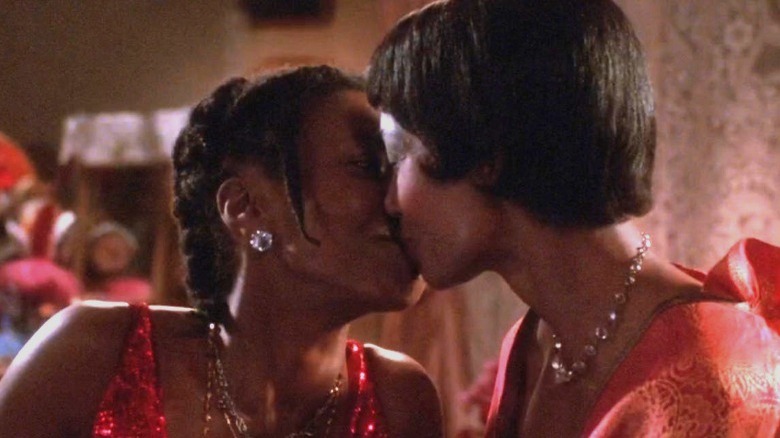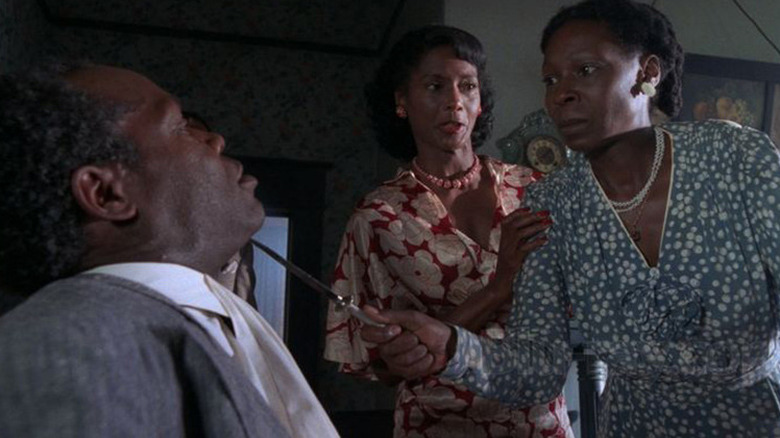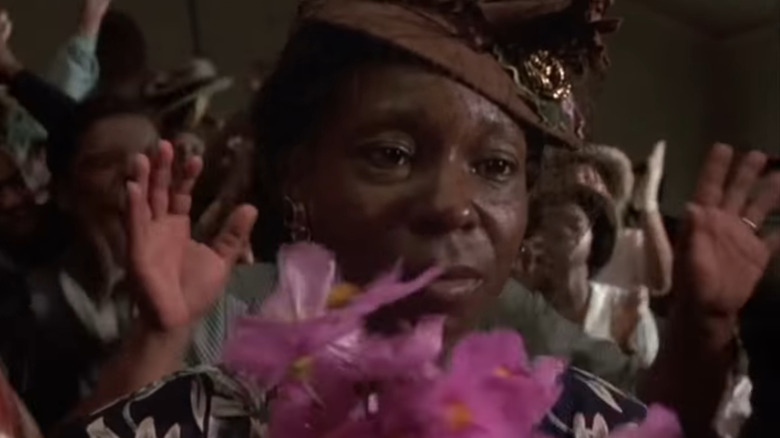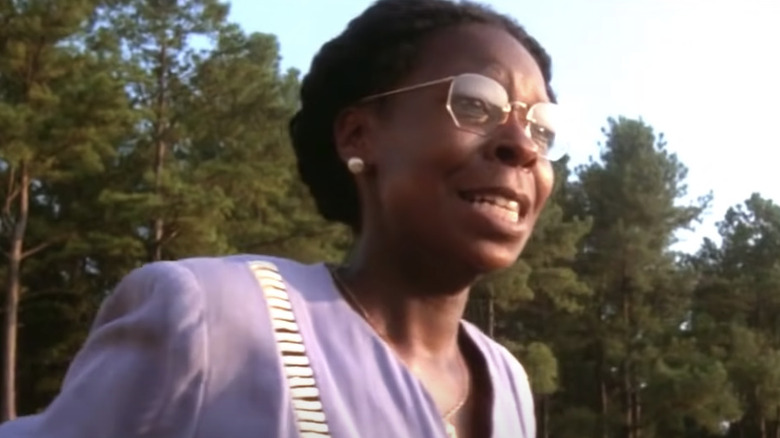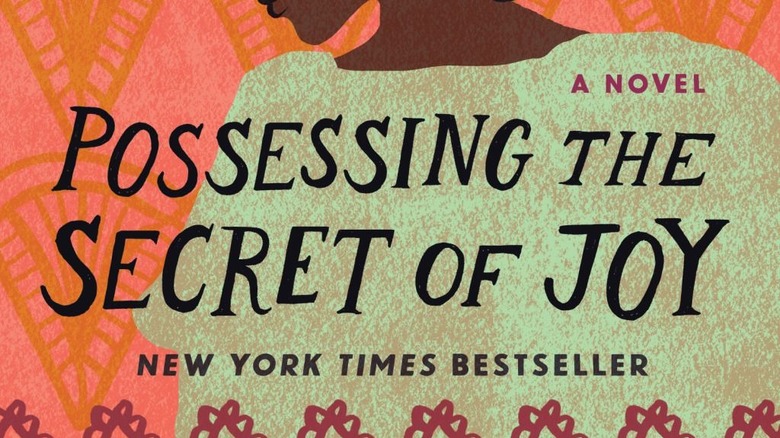The Untold Truth Of The Color Purple
When "The Color Purple" debuted in Los Angeles in 1985, the world had never seen anything quite like it. Adapted from Alice Walker's third novel, it tells the story of Celie, a young Black girl growing up in early 20th century America. The film doesn't flinch at topics that make folks uncomfortable, and that won the movie both critical praise as well as horrified condemnation.
One thing everyone could agree on, though, was its success. The movie took in nearly $100 million in domestic ticket sales. In 2005, it was made into a Broadway musical, which is now being turned back into a film. As exciting as that is, the original movie will always remain a classic, and the stories of its creation are just as gripping as the film itself. And how could they not be?
"The Color Purple" was helmed by three of the greatest creative minds out there — Walker, executive producer and composer Quincy Jones, and director Steven Spielberg. It introduced us to now-household names like Oprah Winfrey, Whoopi Goldberg, and Danny Glover. There's heart, there's humor, there's pain and sacrifice. The behind-the-scenes tales can help you examine the film on a whole new level as you look at what was and what could have been. So, to deepen your appreciation of one of the most important movies of the 20th century, here's the untold truth of "The Color Purple."
The film wouldn't exist without Quincy Jones
In many ways, we can thank the film's executive producer and composer — the legendary Quincy Jones — for making "The Color Purple" a reality. He championed it when no one else did. Oprah Winfrey asked him how he knew it would work as a movie during the film's 25th anniversary reunion on her show. Quincy responded by pointing to his heart.
"Everybody in town was saying, 'Quincy Jones is out of his mind,'" he said of his quest to convince Steven Spielberg to direct. "He thinks he's going to get the greatest director in the world on his first movie. That's when I found the power of being underestimated." He convinced Spielberg to take on the project, but that was only half the battle. The other half was convincing Alice Walker to not just give him the rights for the movie, but to also agree to Spielberg as the director.
Walker, though, had never even heard of Steven Spielberg before. But then, as she explained to Democracy Now!, she went to see "E.T." with her daughter and loved it. In her memoir, "The Same River Twice: Honoring the Difficult," Walker shares her journal entry of their first meeting: "Quincy had talked so positively about [Spielberg] I was almost dreading his appearance." However, he quickly won her over with his enthusiasm, so by the end of the meeting, she'd agreed to write the screenplay with Spielberg. The movie was a go.
Alice Walker submitted a screenplay with two different titles
While Alice Walker was convinced that Steven Spielberg was the man to bring her movie to life, she still had a hard time trusting that it would turn out properly. And really, it was understandable for her to doubt that a white director could fully understand and appreciate a Black historical epic like "The Color Purple" enough to properly translate it to the big screen.
As she writes in "The Same River Twice: Honoring the Difficult," she wrote the screenplay with two titles: "The Color Purple" and "Watch for Me in the Sunset." "Some part of me was afraid that no matter how good his intentions," she confesses, "Steven's version of 'The Color Purple' would not deserve the name. And so I created an alternative title for his film."
While she ultimately went with her book's name for the film, Walker never quite shook the feeling that the movie was not fully telling the story she wrote. As she told NBC News for the film's 30th anniversary, she preferred the 2005 musical version to the movie because it better reflected the entirety of "The Color Purple" story. "I think the musical gives people a more impactful feel of the relationship between Celie and Shug," she explained, "which is better developed than in the film."
Whoopi Goldberg has Black E.T. to thank for her role
By now, Whoopi Goldberg has done it all — movie star, TV actor, and talk show host — but believe it or not, "The Color Purple" was her first leading film role. Back then, she was a theater actress and comedian with a successful and hilarious one-woman Broadway show. As Goldberg told Jimmy Fallon on "The Tonight Show," when the folks making "The Color Purple" got wind of her show, Steven Spielberg asked her to audition at his own theater in Amblin Studios. There, she performed in front of a Who's Who of celebrities, including Michael Jackson and Quincy Jones.
The comedian did a few bits from her show, and everyone loved it, so Spielberg asked if she had more material. Goldberg said, "Yes, but I'm not sure you're gonna like it. It's about BlE.T ... It's the Black E.T. and he lands in Oakland. And he's in the projects with the kids." It's the one skit her team had told her not to do, but Spielberg replied, "I need to see this."
She performed the bit and thankfully, Spielberg loved it. But more importantly, as Goldberg told Fallon, "He understood why I was writing it. [E.T.] needed to remember who he was and where he came from." The filmmaker was so impressed with Goldberg that she ended up getting the lead role. "Listen, it's not bad to have a good origin story," she quipped to Fallon.
Oprah and Whoopi auditioned for the same part
Both Whoopi Goldberg and Oprah Winfrey were huge fans of "The Color Purple" novel, and they each wanted the same role. It wasn't the lead, though; according to ABC News, they both tried out for Sofia, but Oprah was the one who got it. "I just became obsessed with being a part of this movie," Oprah noted in the 2010 reunion on her show. "And it was, I believe, divine order, fate, that made it possible."
Goldberg explained in a Masterclass interview that she was such a big fan of "The Color Purple" that she wrote to Alice Walker, saying that if they ever made a movie of the book, she'd be willing to "play dirt on the floor" just to be a part of it. It turned out Walker was also a fan of Goldberg and in fact, was the one to bring her to Spielberg's attention.
The comedian had impressed Spielberg and Jones so much during her audition that instead of offering her Sofia, they asked her to play Celie. But Goldberg didn't want to be the star. "I never made a movie before," she told Winfrey in the reunion. "I didn't know how this thing worked, and if I messed it up, I didn't want to get in trouble." It took some work on Spielberg's part to convince her that she was up to the task. But convince her he did, and with Sofia and Celie in place, movie history was about to be made.
Oprah almost lost the part
After auditioning for Sofia, Oprah went off on something of a spiritual journey. She described the events at Essence Fest: Three months had passed since trying out for "The Color Purple," and she got so tired of waiting that she called the casting director herself (via EW). He blew up at her for breaking "Hollywood protocol" (i.e. not waiting for his call), and after hanging up, Winfrey broke down. Convinced that she'd lose out on the part because of her weight, the television host went off to a "fat farm" to shed 25 pounds.
One day, she was jogging in the rain, feeling dejected and like she was at the end of her rope. She suddenly felt moved to break out into the church hymn, "I Surrender All." At that moment, someone ran up to tell her that someone named Spielberg was on the phone for her. "[Steven] says, 'I hear you are on a fat farm,'" Oprah recalled. She replied, "'No sir, this is a health retreat.' He says, 'I'd like to see you in my office in California and if you lose a pound you could lose this part.'" That was all the soon-to-be-actress needed to hear. "I packed my bags," she declared. "I stopped at the Dairy Queen — three scoops just in case I lost half a pound. Next day, I was in Spielberg's office and he said, 'You're hired.'"
Alice Walker hated the movie at first
When the film was finally completed, Alice Walker had a hard time warming up to it. All of her misgivings seemed to have been proven true. She was on set nearly every day, but, as she admitted in "The Same River Twice: Honoring the Difficult," she didn't always feel comfortable or up to the task of pointing out the "errors" she saw being made.
When she saw the film for the first time in a nearly empty theater with just two other people, she felt that "everything about it seemed wrong, especially the opening musical score, which sounded like it belonged in 'Oklahoma.'" But then she attended the movie's New York premiere in a packed theater full of "enthusiastic viewers all sobbing and guffawing in my ear, and I was able to critique the film for its virtues rather than its flaws."
After that moment, although she came to appreciate its virtues, her feelings about "The Color Purple" movie remained complicated. Whenever she's been asked about it over the years, she says she often switches between "I loved it" to "I have mixed feelings." Over time, though, her favorite response became, "The movie is not the book." It's a familiar refrain you'll hear from nearly every book-lover who's seen their favorite novel translated to screen. The cinematic interpretation can almost never live up to the original, especially with a story as complex and deep as "The Color Purple."
Steven Spielberg removed Celie and Shug's relationship
One of Alice Walker's (and fans') biggest criticisms of the film is how much it toned down the romantic relationship between Celie and Shug. And by toned it down, we mean reduced it to a single kiss. Their relationship is a huge part of the novel, but the film barely even hints at it. Its loss is part of the reason that Walker prefers Oprah's musical to Steven Spielberg's film.
Cutting this significant relationship down was Spielberg's decision. Well aware of the controversy over the years, when he spoke with Entertainment Weekly back in 2011, he was candid in admitting that he "was the wrong director" to handle the lesbian relationship. He didn't think that including more than that kiss would allow them to get a PG-13 rating, so he scrapped it all. "I was shy about it," he said about the sexuality in the novel. "I basically took something that was extremely erotic and very intentional, and I reduced it to a simple kiss. I got a lot of criticism for that."
But that doesn't mean he would change a thing. When asked if he'd handle the relationship differently these days, he held his ground. "I wouldn't, no," he insisted. "That kiss is consistent with the tonality, from beginning to end, of 'The Color Purple' that I adapted."
The film was criticized for its portrayal of Black men
Though many now hail the film a classic, when "The Color Purple" was first released, some people hated it because of how they felt Black men were portrayed. It was an accusation Alice Walker had already endured after the publication of her book, but the attacks grew worse after the film was released, as Walker was thrust into the public light in a new way. Even members of the NAACP protested the film.
Walker writes in her book about the making of the film, "The Same River Twice: Honoring the Difficult," that the hardest accusation to tolerate was "the charge that I hated Black men." She went on to note that for her entire life, she had relied on the "fiercely sweet spirits of Black men" and that's something that should be clear in her work.
"I was surprised that people didn't understand the compassion I feel for Black men," Walker later elaborated on the Banished podcast. "I see them as very human, and I don't see them as different from any of the other men on the planet. I mean, the men who do bad things in my novels are the same men who do bad things in China." Eventually, though, she realized that her most zealous critics had never read her books. They were just going off of the film. "That helped," she acknowledged. "I said, 'Oh, they didn't read them.' And I think that's true and it's unfortunate."
The Color Purple is a theological journey
Alice Walker has deep spiritual beliefs. She feels that meditation is a way to help understand yourself and "get rid of a lot of stuff that you actually don't need to continue carrying around with you" (via Beliefnet). She often works her beliefs into her works, though it's not always obvious to the casual reader. "'The Color Purple' is about theology," she explained to Beliefnet, describing the book as a "Buddha book that's not Buddhism." Confused? Buddha was once a prince, who found enlightenment by searching for a way to deal with the horrors and suffering of life. That's the same thing that Celie does.
"Many people assume that it's about just about incest, wife abuse, spouse-beating," Walker explained. "All of that is in there, but you will notice that the journey that Celie is making is toward her self-realization as a part of the entire Godness." But that didn't come through in the movie that Steven Spielberg directed. His vision and his focus were different. Walker notes in "The Same River Twice: Honoring the Difficult," that instead, Spielberg "was more interested in showing the transformation of Mister to Albert." So, the theology of the novel was lost in translation, and it became more of a story of Albert's redemption than Celie's self-realization.
The film made Oscar history
"The Color Purple" was nominated for a remarkable 11 awards at the 58th Annual Academy Awards in 1986. It seemed poised to clean up in every category, from Best Picture and Actress to Best Costume Design and Makeup. The movie was getting the recognition it deserved. Until it wasn't. The movie didn't win in a single category for which it was nominated. This slew of losses tied it with a 1977 movie called "The Turning Point" for the most nominations without winning (via The LA Times). "The Color Purple" should have been making history, but not like that.
Back in 1986, there was no social media to bring the gross inequality to light in the same way that the hashtag #OscarsSoWhite did more recently — but that doesn't mean it went unnoticed. As the Los Angeles Times reported, the Hollywood-Beverly Hills chapter of the NAACP filed a letter of protest against the Academy, accusing them of racism. The Academy's response? It's an honor to be nominated, and since the film got 11 nominations, there was clearly no racism.
The film did fare better elsewhere. Whoopi Goldberg's performance won Best Actress at the Golden Globes that year, although the Hollywood Foreign Press shut the movie out of its other four nominations. And despite the NAACP's conflicting feelings about the movie's portrayal of Black men, "The Color Purple" won Outstanding Motion Picture and Goldberg won Outstanding Actress at that year's NAACP Image Awards.
There's a sequel (of sorts)
10 years after the publication of "The Color Purple," Alice Walker released a follow-up novel called "Possessing the Secret of Joy." It follows Tashi, a minor character of "The Color Purple." She's the woman that Celie's son, Adam, marries while living in Africa. In the film we barely get to see her, but in the original novel, she undergoes female circumcision as a young woman before returning to the United States with Adam.
"Possessing the Secret of Joy" follows the ramifications of that trauma: Tashi feels torn between two worlds and two cultures, and she goes mad after having the procedure done. Like "The Color Purple," it is not an easy read, and it dealt with topics like female genital mutilation long before the majority of Americans even had a clue what that was. But that's exactly why Walker wants to see it be her next work adapted from the page (via NBC News).
"[Possessing the Secret of Joy is] the one that I would really like people to see and think will be very good for the world actually to deal with," she told NBC News. "It's a wonderful story but it also has this reality at the foundation that if we don't deal with stopping the spread of disease, we lose so many more of our sisters and brothers in Africa and elsewhere." So, some day, if Walker has her way, we may see a sort of sequel to "The Color Purple," rather than another remake.
